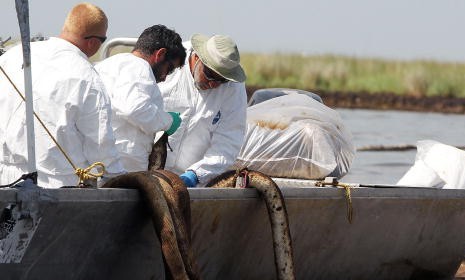BP's scientist-'buying' plot
The oil giant is offering side work worth more that $100,000 a year to marine researchers along the Gulf Coast. Critics say they're investing in tight lips

As BP gets closer to the cleanup stage of its massive oil spill in the Gulf of Mexico, it has been hiring marine scientists at public universities all along the Gulf — essentially buying their silence as well as their services, the Mobile, Ala., Press-Register reports. What does BP want with scientists, and who doesn't it want them talking to? (Watch Rachel Maddow compare BP to "The Sopranos.") Here's a concise look at BP's scientist shopping spree:
What does BP want with outside scientists?
To help it fight Gulf spill–related lawsuits, especially an expected federal Natural Resources Damage Assessment suit. BP also says it's hiring experts to help it understand the extent of the damage to the Gulf and come up with a plan to restore it. Critics see a darker motive. BP is "trying to buy faculty silence in a comprehensive way," so Gulf-region experts can't help in anti-BP lawsuits, says Cary Nelson of the American Association of University Professors.
The Week
Escape your echo chamber. Get the facts behind the news, plus analysis from multiple perspectives.

Sign up for The Week's Free Newsletters
From our morning news briefing to a weekly Good News Newsletter, get the best of The Week delivered directly to your inbox.
From our morning news briefing to a weekly Good News Newsletter, get the best of The Week delivered directly to your inbox.
What kind of scientists are getting offers?
For the most part, those engaged in research related to the ocean and its ecosystems. Bob Shipp, head of marine sciences at the University of South Alabama, says he turned down BP's offer to hire his whole department, because of the restrictive confidentiality clause.
What's so restrictive about the contracts?
Scientists who sign up with BP agree not to publish their research, share it with others, or even speak about the data they collect for at least three years, or until BP receives final approval on a plan to restore the Gulf. Also, they are only paid for research approved, in writing, by BP, and they agree to communicate with the company through its lawyers. "This is not an agreement to do research for BP," says Alabama environmental lawyer Robert Wiygul. "This is an agreement to join BP's legal team."
A free daily email with the biggest news stories of the day – and the best features from TheWeek.com
What is BP's reaction to the criticism?
BP says it isn't muzzling scientists, just protecting confidential information, "as is customary." The oil giant also "does not place restrictions on academics speaking about scientific data" and "does not take the position that environmental data are confidential," BP says.
What's BP's going rate?
According to several scientists, BP offered them $250 an hour. Since faculty at state universities are typically allowed to do eight hours of outside consultation per week, BP's contracts would be worth up to $104,000 a year, plus any signing bonus. BP has also said it will give out $500 million in research grants to study the oil spill, which the Natural Resources Defense Council calls another attempt to buy the loyalty and cooperation of Gulf scientists.
Has BP had any takers?
Yes, "more than a dozen" from Louisiana State University, University of Southern Mississippi, and Texas A&M, and other state and national institutions, according to academic officials and BP.
Why wouldn't scientists sign up?
Southern Alabama's Shipp says he "didn't like the perception of the university representing BP in any fashion." Other scientists say they think agreeing to BP's conditions would be bad for science and public policy. Also, federal officials have reportedly informed scientists they will lose federal funding, including for unrelated, ongoing research, if they accept BP's offer. And why not, says Cary Nelson. "I mean at some level, this is really BP versus the people of the United States."
Sources: Mobile Press-Register, CBS News, Guardian, BBC News, Grist
-
 5 chilling cartoons about increasing ICE aggression
5 chilling cartoons about increasing ICE aggressionCartoons Artists take on respect for the law, the Fourth Amendment, and more
-
 Political cartoons for January 24
Political cartoons for January 24Cartoons Saturday's political cartoons include 3D chess, political distractions, and more
-
 Ryanair/SpaceX: could Musk really buy the airline?
Ryanair/SpaceX: could Musk really buy the airline?Talking Point Irish budget carrier has become embroiled in unlikely feud with the world’s wealthiest man